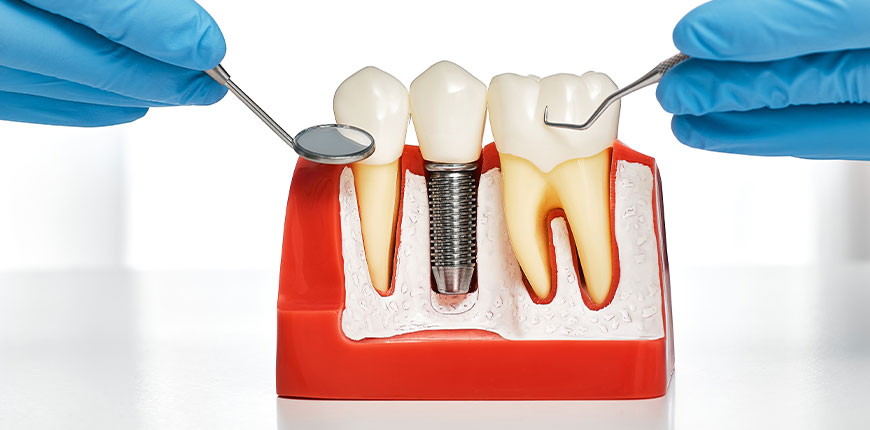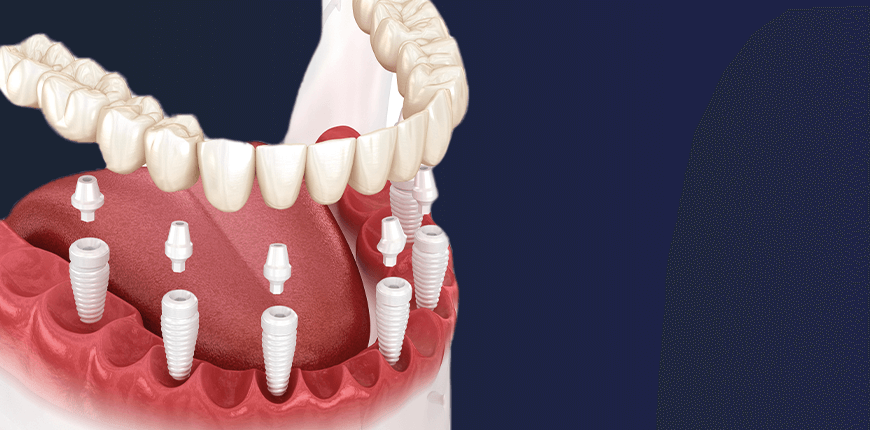
Dental Implant
Dental implant treatment is a procedure in which an artificial tooth root is placed into the jawbone to replace a missing tooth or teeth. The implant is made of titanium or other materials that are compatible with the body and over time, the implant fuses with the surrounding bone to provide a stable base for a replacement tooth.
What is Dental Implant Treatment?
Dental implant treatment is a dental procedure that involves surgically placing a small titanium or biocompatible post into the jawbone to replace missing or damaged teeth. Dental implant treatment is often performed by a specialist known as an oral surgeon, periodontist, or prosthodontist, depending on the complexity of the case. This post acts as an artificial root that supports a dental crown, bridge, or denture. The implant is anchored securely to the jawbone, providing a stable foundation for the replacement tooth or teeth. Dental implant treatment is considered a highly successful, long-lasting solution for missing teeth that provides a natural look and function similar to natural teeth.
Who is a Good Candidate for Dental Implant?
The person who wants to be a candidate for dental implant treatment should have some characteristics.
- Good oral Health: The candidate should have healthy teeth and gums, with no active gum disease or decay, which could compromise the success of the implant.
- Sufficient Bone Density: The candidate should have enough bone in the jaw to support the implant. If there is not enough bone, bone grafting or other procedures may be needed before implant placement.
- Good Overall Health: The candidate should be in good general health, with no uncontrolled chronic diseases, such as diabetes or heart disease, which could affect the healing process.
- No Habits That Could Affect Healing: Smoking or chewing tobacco can affect healing and increase the risk of implant failure.
- A Commitment to Good Oral Hygiene: The candidate should be willing and able to commit to good oral hygiene practices, including brushing and flossing regularly, to maintain the implant's longevity.
It is important to note that not everyone may be an ideal candidate for dental implant treatment, and a thorough dental examination is necessary to determine the suitability of the candidate.
How is a Dental Implant Performed?
 Dental implant treatment process includes some steps.
Dental implant treatment process includes some steps.
- Initial Consultation: During the initial consultation, the dentist or oral surgeon will evaluate the patient's dental and medical history and perform a thorough dental examination, including x-rays and other diagnostic tests, to determine if they are a suitable candidate for dental implants.
- Implant Placement: This procedure is typically performed under local anesthetic or conscious sedation to ensure the patient is comfortable during the procedure. The dentist or oral surgeon makes a small incision in the gum tissue to access the jawbone where the implant post will be placed. Once the post is in place, the incision is closed with sutures.
- Osseointegrasyon: After implant placement surgery, the patient will need to allow time for the implant to fuse with the surrounding bone tissue, a process called osseointegration. This period can take several months and the patient is expected to follow the aftercare instructions provided by the dentist during this time.
- Abutment Placement: Once the implant is fully integrated with the bone tissue, the dentist will attach an abutment to the implant, which will act as a connection between the implant and the final restoration.
- Restoration Placement: Once the abutment is in place, the dentist takes impressions of the patient's teeth to create a custom-made restoration such as a dental crown, bridge or denture to be attached to the abutment.
- Follow-up Care: Once the restoration is in place, the patient needs to continue to practice good oral hygiene, including brushing and flossing regularly and scheduling regular dental examinations to ensure the longevity of the implant.
The dental implant treatment process can take several months to complete, depending on several factors, including the number of implants needed and the extent of dental work required.
How is Recovery Proceed After Dental Implant?
The recovery process after dental implant treatment may vary depending on the individual's health, the number of implants placed, and the complexity of the procedure. There are some general rules that will accelerate the postoperative healing process and provide the healthiest recovery.
- Resting and Avoid Strenuous Activities: It is essential to rest for the first few days following surgery and avoid any strenuous activities or heavy lifting.
- Pain Management: Pain, swelling, and discomfort are common following implant placement surgery. The dentist may prescribe pain medications, anti-inflammatory medications, or antibiotics to manage the symptoms.
- Ice Therapy: Applying ice to the affected area can help to reduce swelling and discomfort. Use an ice pack or a bag of frozen vegetables wrapped in a towel and place it on the affected area for 10-20 minutes at a time.
- Soft Food Diet: The patient should avoid hard, crunchy, or sticky foods and instead eat a soft food diet for the first few days following surgery. It is also essential to stay hydrated by drinking plenty of fluids.
- Oral Hygiene: The patient should practice good oral hygiene, including gentle brushing and flossing around the implant site, to keep the area clean and reduce the risk of infection. The dentist may also recommend a special mouthwash or saline solution to rinse the mouth.
- Follow-Up Visits: The patient should attend all scheduled follow-up appointments with the dentist or oral surgeon to monitor the healing process and ensure the implant's success.
It is essential to follow all post-operative instructions provided by the dentist or oral surgeon to ensure a smooth recovery and the longevity of the dental implant.
-
How long do Dental Implants last?
Dental implants can last a lifetime with proper care and maintenance, including regular dental checkups and good oral hygiene practices. However, the lifespan of the implant may vary depending on factors such as the patient's overall health, lifestyle habits, and the quality of care provided.
-
Will Dental Implants look and function like natural teeth?
Dental implants are designed to look and function like natural teeth, providing a more natural and comfortable fit compared to other tooth replacement options. Additionally, dental implants are more stable and durable, allowing patients to enjoy their favorite foods and activities with confidence.
-
Are there any risks or complications associated with Dental Implant treatment?
Like any surgical procedure, dental implant treatment carries some risks, including infection, nerve damage, and implant failure. However, these risks are relatively rare, and most patients experience successful outcomes with minimal complications.










